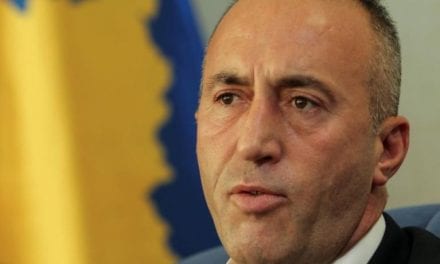By Pavel Felgenhauer, Jamestown Institute
Several Israeli Defense Forces (IDF) F-16 jets bombed and destroyed an industrial warehouse in the Syrian coastal city of Latakia, on September 17. According to Israeli sources, the warehouse contained Iranian military equipment earmarked for the militant group Hezbollah. The Russian airbase of Hmeymim is located about 25 kilometers from the destroyed target. No Russians were present at the bombed site. But just about 20 minutes after the Israeli airstrike, a Russian IL-20 electronic intelligence–gathering turboprop plane was hit and downed by a Syrian anti-aircraft S-200 missile over the Mediterranean, as it was approaching Hmeymim. All 15 Russian officers onboard the IL-20 were killed and awarded Russian state medals posthumously. Despite the intelligence aircraft being downed by a Syrian Arab Army (SAA) antiaircraft battery, the Russian military has unequivocally blamed the IDF pilots and command for deliberately provoking the attack on a Russian plane, of undermining Russian trust, and of threatening Russian servicemen in Syria by their aggressive actions (Interfax, September 25).
Israeli Prime Minister Benjamin Netanyahu and Defense Minister Avigdor Lieberman had built up a working relationship with Russian President Vladimir Putin and the Russian military. Unlike most other US allies, Israel has not imposed any sanctions on Russia over Crimea, the war in Donbas, the poisoning of double agent Sergei Skripal and his daughter Yulia in Salisbury, or the alleged Russian interference in US and other Western countries’ democratic elections. The Israeli defense industry has continued to help the Russian military produce modern drones. In return, Moscow has allowed the IDF to attack Iranian and Hezbollah targets in Syria, inflicting casualties on the pro-Iranian forces and their SAA allies with virtual impunity. This cozy relationship seemed under mortal threat in the aftermath of the downing on the IL-20, as Defense Minister Sergei Shoigu blamed the IDF and threatened to take “retaliatory measures” after phoning Lieberman (Militarynews.ru, September 18; see EDM, September 24).
Netanyahu promptly phoned Putin to profess Israeli innocence, and a special Israeli delegation was allowed to come to Moscow to plead the IDF’s case, even as the Russian Ministry of Defense (MoD) publicly condemned the IDF’s treachery. These accusations incited a wave of anti-Israeli verbal attacks from Russian parliamentarians, who demanded immediate sanctions and possible retaliatory missile attacks against targets in Israel (Newsru.com, September 18). Putin somewhat calmed the waters by declaring the loss of the IL-20 was caused by a “chain of tragic circumstances,” noting that the IDF did not actually shoot down the spy plane. Putin called for a thorough investigation, though at the same time he publicly supported the defense ministry’s stance implying IDF guilt (TASS, September 18). After Putin intervened the anti-Israeli campaign in the state-controlled press and in the Russian parliament went swiftly numb. As is traditional in Russia, all had been waiting to know how the Kremlin would decide the case.
An IDF delegation led by Air Force commander General Amikam Norkin arrived in Moscow on September 20. The Israelis were not allowed into the Kremlin as they apparently wanted; instead, they were given an audience with the MoD to present a factual report at a briefing. The IDF insisted the Israeli F-16 jets released their precision-guided weapons and flew back home while the SAA batteries continued to launch long-range S-200 missiles indiscriminately, hitting the IL-20 after the IDF’s attack jets were already hundreds of kilometers away and preparing to land in Israel. The Russian military apparently listened to the IDF report politely but noncommittally (Kommersant, September 21). The Israelis left Moscow satisfied the problem was essentially resolved and that ever-closer cooperation with the Russian military in Syria would continue. Sources in the IDF told journalists in Tell Aviv, “Russia accepts our take” (Times of Israel, September 21). However, the fact that General Norkin was not allowed in the Kremlin was a bad omen that the Israeli military—ignorant of the nuances of Moscow politics—did not understand.
On September 23, after briefing Putin with no Israelis present, the MoD delivered a fresh broadside accusing the IDF of deliberately lying about the IL-20 incident and being the sole and direct party responsible. The defense ministry showed the president computer graphics of Israeli F-16s that, instead of flying home after delivering their payload, stayed in the air between Latakia and Cyprus in range of S-200 missiles, drawing SAA fire. The Israeli jets on the video were then shown maneuvering to deliberately cause a missile to hit the IL-20. The MoD reminded how open and generous it was to the IDF, which apparently repaid its generosity with alleged spite (Militarynews.ru, September 23). Putin’s Israeli-friendly policies in the Middle East have been causing much animosity in Russia’s military and diplomatic establishment, which is traditionally highly anti-Semitic. The IDF, indeed, began the chain of events that led to the downing of the IL-20; but it was the Russian military that failed to properly organize the air traffic at its own Hmeymim base or to contain the trigger-happy SAA. Instead of accepting blame and punishment, Russian generals used the IL-20 case to shift the blame and redirect Russian policy in the Middle East. The MoD has essentially moved to end the tacit agreement to allow the IDF to fly and bomb Russian allies in Syria—an arrangement that had infuriated Russian military command (Novaya Gazeta, September 25).
Shoigu announced Russia will now supply the SAA with S-300 anti-aircraft missiles that it previously withheld because of Israeli objections; and he declared Russian forces would use electronic warfare to suppress GPS and communications in Latakia province and over the eastern Mediterranean, while integrating SAA anti-aircraft assets using a computerized Russian command-and-control system (interfax, September 24). It is still unclear what number of S-300 missiles or what version will be provided. And will they be under Syrian or de facto Russian command?
After another phone call to the Kremlin, Netanyahu announced, “Things could have been much worse,” noting an agreement had been reached to continue military contacts with the Russians (TASS, September 26). The Israeli leader ordered the stop of all IDF leaks or comment about the IL-20 incident. Meanwhile, in Russia, anti-Israeli rhetoric has diminished and the downed IL-20 has virtually disappeared from state-controlled media in Moscow. The future deployment of S-300s could be limited and not cover much of Syria. Apparently the tacit agreement between Putin and Netanyahu may have been modified, but it essentially still stands for the time being.



















